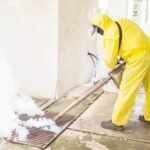The world today cannot fulfill its basic requirements without eco-friendly ways in place and those do not have to be at the expense of nature and our pockets. The kitchen is one area where we can make significant progress which is water plumbing. The addition of a metering device to your kitchen will help you save both water and fuel, decrease solid waste, and even lessen your energy bills by changing your kitchen plumbing slightly to the green area of the spectrum. Furthermore, we shall take a look at a few eco-friendly plumbing ideas that will make your kitchen greener with minimum effort.
1. Install Low-Flow Faucets and Fixtures
A low-flow kitchen faucet can be quite effective when it comes to conserving water, so it will be possible to save some of your water in your kitchen. These fixtures decrease the amount of water that is running out without decreasing their functionality. The newest generation of low-flow faucets can cut water usage by up to 60%, which will translate to substantial savings on your water bill over time. Moreover, low-flow aerators can be attached to your current kitchen faucets to regulate water use without replacing the entire fixtures.
Benefits of Low-Flow Faucets
- Water Conservation: It lowers the water usage in the kitchen as a stop.
- Energy Savings: The less water used, the less energy it needs to be heated for indoor use.
- Long-Term Savings: It reduces the water bill and is good for sustainable living, too.
2. Fix Leaks Immediately
There are some leaky water-ed organs in a kitchen that seem petty or insignificant; however, in the end, they can leak gallons of water every day. The fixed faucet is a necessary part traveler’s truck journey to prevent me from slumping. Even a slow drip can add up to a large quantity of wasted water. Leak-fixing soon after they are found is a necessary responsibility of eco-kitchen plumbing.
For instance, tightening connections or replacing worn-out washers are examples of ways by which small leaks can be sorted out by oneself. However, if there is a larger or more complicated problem, it is best to call in a professional plumber to find a solution. One of the reasons to address the above-mentioned problems, apart from water conservation, is to avoid possible water damage that can lead to mold growth or structural problems.
3. Upgrade to Energy-Efficient Appliances
If your kitchen appliances are outdated, consider upgrading to energy-efficient models. Modern dishwashers and water heaters are designed to use less water and energy while still performing effectively. Look for appliances with the Energy Star label, as these are certified to meet eco-friendly standards.
Eco-Friendly Dishwasher Tips
- Use the Dishwasher Efficiently: Only run your dishwasher when it’s fully loaded to minimize water and energy use.
- Choose Eco Mode: Many dishwashers have an eco-friendly setting that reduces water and electricity consumption.
4. Reuse Greywater in the Garden
Greywater is the waste produced from kitchen sinks, dishwashers, and washing machines but it only includes the relatively clean water. By letting the greywater flow down the drain, homeowners often unknowingly waste it without even thinking about it. However, it is possible to avoid this by utilizing a solution that is both simple and practical – recycling the greywater by filtering it and using the filtered water in the garden for irrigation.
Steps to Reuse Greywater
- Install a Greywater System: Install a system that will collect and segregate greywater, allowing it to be reused after filtration.
- Use for Irrigation: After being purified, greywater can be used for irrigation of ornamental plants in your backyard area.
- Check Local Regulations: Ensure management of sewage from the unit complex is adhering to the rules and regulations outlined.
5. Compost Food Scraps Instead of Using the Garbage Disposal
Garbage disposals are popular on a daily basis among a lot of people because many people are used to them in their homes for the reason of food waste disposal today. However, these gadgets are the consumers of huge amounts of water and energy. It is a one hundred percent eco-friendly substitute that composts your food leftovers instead of sending them to be washed out down the drain. Composting reduces the pressure on your plumbing system, caters to clogs, and provides rich nutrients for your garden.
Benefits of Composting
- Reduces Water Usage: Less water which is being liquefied with garbage disposals is needed.
- Creates Less Waste: Food scrap that is supposed to aggregate in landfills and sewage systems is kept away.
- Enriches Soil: Develop an organic fertilizer that can help in the soil improvement of the garden area.
6. Choose Sustainable Materials for Pipes and Fixtures
The material you choose for the kitchen plumbing can also make a difference in your environmental impact. Consider using sustainable materials such as PEX (cross-linked polyethylene) pipes that have more durability and are more efficient than the conventional ones made of copper. More specifically, PEX pipes (other materials, e.g. copper) are less energy-intensive, resulting in a lower carbon footprint, and they can be recycled, thus offering a greener choice in kitchen plumbing.
Why Choose PEX Pipes?
- Durable and Long-Lasting: PEX pipes are designed to be long-lasting, which in turn reduces the number of replacements.
- Resistant to Corrosion: PEX pipes, unlike metallic pipes, do not rust or corrode, and therefore they produce clean water.
- Energy-Wise: Their production and transportation cause some energy, but PEX pipes need less energy to move from the factory to the site for installation in a building compared to copper.
7. Practice Water-Saving Habits in the Kitchen
The major shrinkage of water consumption supplies can be achieved by the practice of water-saving principles in the kitchen. The following are these habits:
- Turn Off the Tap While Washing Dishes: Refraining from leaving the water on and simply using the water in the sink or a tub will prevent the wastage of water while cleaning the dishes.
- Soak Pots and Pans: This soaking in water before scrubbing also cuts down on the amount of water needed for cleaning dishes.
- Defrost Food in the Fridge: The most energy-efficient and water-conserving way to defrost frozen food is doing it in the fridge, not under running water.
8. Insulate Hot Water Pipes
Insulating the hot water pipes in your kitchen is a simple way to prevent energy loss and will also make your plumbing system more efficient. By insulating the hot water pipes, you allow for a longer staying warm of the water it instead of running the faucet for a longer time to get hot water. This way, less energy is consumed for re-heating water, and is a double benefit since we save on water too.
How to Insulate Hot Water Pipes
- Use Foam Insulation: Get foam pipe insulation these days by wrapping the pipes with appropriately cut foam pipe insulation and securing them with it.
- Seal the Ends: Use tape to seal the insulation to avoid the slipping off.
- Focus on Exposed Pipes: Insulate pipes that are in unheated places such as basements, crawl spaces, or those near the outside walls.
9. Opt for Water-Saving Dishwashing Techniques
Aside from the energy-efficient dishwasher, practicing water-saving dishwashing techniques can also decrease water consumption in your kitchen. One of the easiest ways to do this is to scrape instead of rinse your plates before putting them in the dishwasher. This way you save water that you would have used to fry your food.
10. Regularly Maintain Your Plumbing System
Keeping your kitchen plumbing functional involves ensuring that it is environmentally friendly. This involves looking for leaks, clearing drains to avoid clogs, and looking at your pipes if they are damaged. Maintenance is key to eliminating bigger issues that can impose financial implications and loss of water.
Why Regular Maintenance Matters
- Prevents Leaks: Identifying leaks at an early stage conserved water.
- Improves Efficiency: A properly maintained plumbing system uses less water and energy and thus operates more efficiently.
- Extends Lifespan: By taking care of your pipes and fixtures, you will ensure that they will last longer thus, a replacement will not happen as often.
Improving the environment even a little bit is a step in the right direction of environmental conservation.
Conclusion
Implementing eco-friendly methods in the kitchen is a great simple strategy to conserve water and energy, and at the same time to foster sustainability. By making small differences like low flow fixtures, reusing greywater, or less common ways by also composting food scraps, all these methods are changes that work, but you also enhance the quality of life. Other activities such as regular plumbing system maintenance and the use of sustainable materials are also important. Just start with these tips today, and you will be able to lessen your environmental impact while saving on utility costs.







